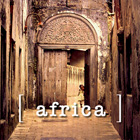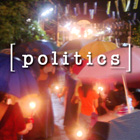
|
|||||||||||||||||||||
Photo credit for "Africa" graphic, above: © 2005 Jennifer Lewis |
DARFUR REFUGEE CRISIS STILL STEEP, UNRESOLVED
5 July 2005 First reported by Sentido on 14 May 2004 as part of our Daily Intercept, the ethnic cleansing campaign in Darfur, western Sudan, continues to this day, and new information is coming to light about the plight of refugees to the Chad border. Journalist Sorious Samura's documentary Surviving Sudan, presented on the Discovery/[NY]Times Channel, follows Samura's travels with a refugee family fleeing wartorn Darfur, heading for UN-sanctioned camps in eastern Chad. The Darfur crisis is marked by sporadic but continued assertions by world leaders that the violence there cannot be termed "genocide", though the US State Department, followed by the White House, took the lead in telling the UN the conflict had to be termed genocide. The problem has long been that the use of the word "genocide" is supposed to trigger certain security actions according to treaties determining the actions of the UN Security Council, and powerful nations have had various reasons for not wanting to be seen as obliged to send troops into a bloody genocidal civil war, however one-sided, however desperate the suffering of the persecuted group. Walking for four days to reach the Breidjing refugee camp, overseen by the UN High Commission for Refugees (UNHCR), Sorious and his host, Adam, and his family, finally reach what should be their safe haven, having had little to no sleep and hardly any nourishment for the entire journey, only to discover that the system in place will not permit any aid to be dispatched to anyone not officially "registered" as a recognized Sudanese refugee. Refugees can only communicate with camp officials through "elected representatives", so they must first seek one of these figures in order to have their case presented to the Chad officials. Only then can they achieve the all-important registration which will provide them with bracelets and the ability to request food aid and/or tents, if and when either becomes available. Despite having footage showing the trek from Darfur into Chad, and eventually to the camp, there is no way for the family to prove its status to local officials. In Samura's report, officials from the Breidjing camp are seen arbitrarily deciding without any evidence, that Adam and his family are not in fact Sudanese at all and are simply locals looking for a handout; they are denied access to any aid over and over again, and are told that there is no appeal, the camp officials in their office tent are the final and all-encompassing authority (a blatant falsehood under the UNHCR mandate). These people have witnessed the slaughter of family members and friends by members of the Khartoum-backed death squads, euphemistically known as Janjawiid militia (meaning in the singular "man with a horse and a gun"). They have walked more than four days through unforgiving terrain, to reach this UN camp where they now describe their treatment by saying "here, they treat us like animals". Clearly, nothing about the UN mandate to feed, shelter and protect the refugees from Darfur is being carried out in spirit. The situation is so grave that when Samura decides too much time has passed and he must do something to help his friendly host family, calling the UN spokesman for Chad, he obtained admissions from UNHCR spoeksman Eduardo Cue that "we have been somehwat overwhelmed by events" and that the situation violates the rights of refugees as laid out in the UN mandate for the camps. Sorious Samura traveled and lived with Adam and his family for more than 3 weeks; he left them to complete the documentary and file his reports after staying 3 weeks in the Breidjing camp, awaiting food aid and official refugee status. Only 3 weeks after leaving them did they finally get moved to a new camp where food and shelter were made available to them. It remains unclear what motivated the officials overseeing the registration process at Breidjing to refuse status to Adam and his family, though they were represented by an "elected official" whose testimony should have been enough to get their names on the mysterious list, and why they repeatedly lied to Eduardo Cue when they were confronted with the inadequacy of their services to these refugees. Whatever the process of prosecutions for crimes against humanity, whatever political figures may eventually be called to task and imprisoned for their involvement in the Darfur genocide, the international community still clearly has a long way to go in meeting the needs of those fortunate Darfurians who were able to escape the ravages of the Janjawiid death squads. With adequate use of funds, diplomacy airspace, and helicopters, there is no reason at all why all of the tens of thousands of Darfur refugees huddled in UN camps in eastern Chad should not have direct access to the aid already demanded by western peoples of their governments and promised by the UN. REPORTS FROM HUMAN RIGHTS WATCH:
BACKGROUND: The refugee crisis in Darfur, in western Sudan, is deepening, with more Sudanese seeking refuge in the dangerous neighboring country of Chad. The UN has designated the Darfur crisis the world's worst humanitarian disaster at present. Earlier this week, the UN hosted a major donor conference in Geneva, and the US has since pledged an additional $188 million, in order to address the growing unrest and escalating risk of mass starvation among the refugee communities. [Full Story] |
||||||||||||||||||||
|
|||||||||||||||||||||

